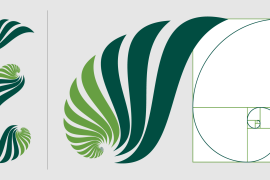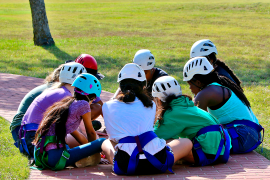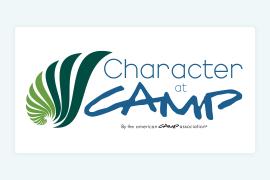Can campers learn heartfelt gratitude? Yes! As we know, camp changes the lives of campers. This is done in large part by intentionally creating programs that nurture the culture of your camp. At Camp Odayin, we practice the habit of heartfelt gratitude. We may win over our campers with our silly songs and messy activities; however, our focus on gratitude and self-acceptance is central to our culture.
During the week at camp, we hold small group sessions for one hour where we set the stage for campers to speak from the heart, share their voice, and to be vulnerable. The act of sharing and listening is powerful — they get to understand what camp means to everyone and why campers come back each summer. They tell us that camp makes them feel like they belong and that they no longer feel alone. Heads nod, smiles appear; campers bond and find comfort together. The act of genuine reflection can help a camper connect to being grateful in an honest way.
We have developed a flexible lesson plan on gratitude that can be adapted based on the age and understanding of the campers.
The plan includes these general steps:
- Discuss what it means to have a thankful heart, what synonyms we have for being thankful, and things they are thankful for each day (at home, school, etc.).
- Read I’m Thankful Each Day! by P.K. Hallinan.
- Talk about the culture of Camp Odayin. Campers share about their experience of camp and what it means to them.
- Share that camp is possible because of generous donors and camp volunteers.
- Direct their creativity to make cards for our donors. Provide parameters to what the campers write, such as what words to avoid and that they should sign their first name only. Have them write why they like camp and why they are grateful for attending. Decorate with stamps and stickers.
- Take a photo of the smiling camper and paste in the card.
“Hi my name is Alex. I’m having so much fun at camp and eating super good food. I just want to say Thanks!”
“Thank you so much for giving me the beautiful opportunity to come to Camp Odayin. I appreciate it because for me personally, it is a sanctuary, a place where I can have fun and relax, without the stress of doctors, parents and everything else. Camp is a break from my reality that is often very much needed. I am very grateful for your donation. Thank you for your generosity, Hannah”
“We have so much fun at camp swimming, meeting friends, and talking. I love Camp Odayin. Thank you, Aidyn”
What Have We Learned?
- Creating a detailed lesson plan for the facilitator sets a consistent tone and creates the goal of true gratitude and reflection. If needed, some campers may need to leave if they are not able to be serious; have them re-enter with a more focused, calm attitude.
- It is helpful to have the leader walk around the room to monitor and prompt for more reflection.
- New campers may have a more challenging time coming up with ideas so schedule their session for later in the week.
- Younger children may not be ready to write their thoughts but they may be ready to talk about being thankful. Have the facilitator transcribe the camper’s words on the card. Providing prompts or specific sentences can help get ideas on paper and save time.
- Use opportunities throughout the week to reinforce the practice of gratitude in small ways, like having campers thank their camp counselor or having the lunch room sing to the staff who prepared the meal.
For our campers, taking time during the camp week to reflect and share gratitude continues to create the culture we want at camp. We know that our campers are grateful to attend camp and appreciate having the opportunity to meet new friends with similar emotional and medical needs – helping them to take a moment to reflect and share is a small, life changing step we take to teach heartfelt gratitude.
Resource: Hallinan, P.K. I’m Thankful Each Day! Nashville, Ideals Children’s Books, 1981.
Brooke Byrd and Kris Lukkarila are the program director and office manager, respectively, of Camp Odayin, whose administrative office is just outside of St. Paul, Minnesota. Contact us at info@campodayin.org to talk more about gratitude and our lesson plan. Camp Odayin has been serving young people with heart disease and their families since 2001. February is American Heart Month – use this month to raise awareness about heart disease and create a culture of grateful hearts. Did you know that every 15 minutes a child is born with a congenital heart defect? Read more at cdc.gov/ncbddd/heartdefects/facts.html
Photo courtesy of Laura Hoagland at Camp Odayin in Crosslake, Minnesota




